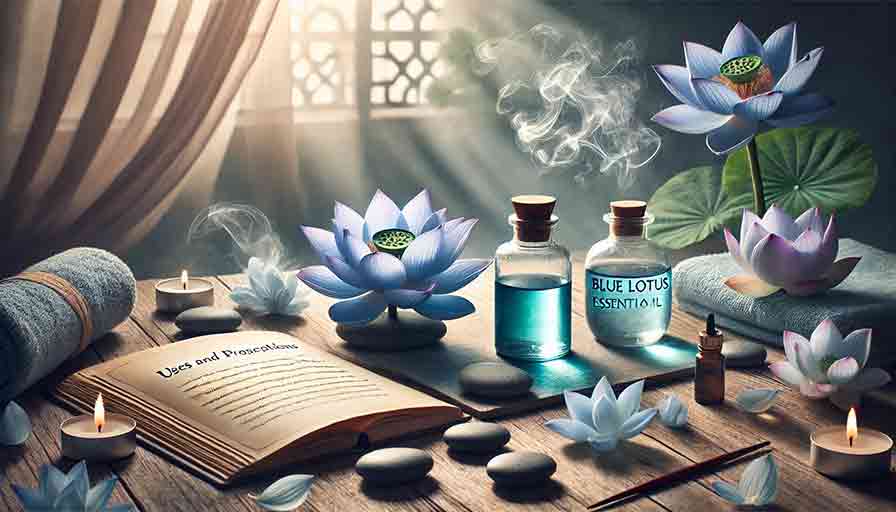The Blue Lotus (Nymphaea caerulea), often referred to as the sacred blue water lily, has captivated civilizations for thousands of years. Revered by the ancient Egyptians for its calming and euphoric effects, Blue Lotus essential oil continues to enchant modern aromatherapy enthusiasts and holistic wellness experts. Extracted from the delicate petals of the flower, this oil offers a unique blend of serenity, sensuality, and spiritual awakening.
In this comprehensive guide, we’ll explore the many uses, benefits, and precautions of Blue Lotus essential oil, helping you make informed choices when incorporating it into your wellness routine.
The Origin and Symbolism of Blue Lotus
The Blue Lotus is native to the Nile River region and parts of East Africa, where it held deep symbolic meaning in ancient Egyptian culture. It was associated with rebirth, enlightenment, and divine consciousness. Depictions of pharaohs, priests, and deities holding Blue Lotus blossoms are found in temples and tombs, signifying its spiritual significance.
Today, Blue Lotus essential oil is prized not only for its exquisite fragrance—a floral blend with subtle fruity and earthy undertones—but also for its therapeutic and meditative properties.
How Blue Lotus Essential Oil is Made
Blue Lotus essential oil is extracted through a solvent extraction process, as the flower is too delicate for steam distillation. The result is a highly concentrated absolute oil, rich in aromatic compounds such as apomorphine and nuciferine, both known for their relaxing and mildly psychoactive effects.
Because the oil is so potent and costly, it is often diluted with carrier oils such as jojoba, fractionated coconut, or grapeseed oil for topical or aromatherapy use. When purchasing, always check for purity, extraction method, and country of origin to ensure authenticity.
Top Blue Lotus Essential Oil Uses and Benefits
1. Promotes Deep Relaxation and Stress Relief
The soothing scent of Blue Lotus oil has been shown to calm the mind, ease anxiety, and encourage emotional balance. When diffused or used in a bath, it can reduce cortisol levels and promote an overall sense of tranquility.
-
Add 2–3 drops to a diffuser before meditation or bedtime.
-
Mix with Epsom salts and warm water for a calming bath.
2. Enhances Meditation and Spiritual Practice
In spiritual traditions, Blue Lotus is known as a crown chakra activator. The oil helps in deepening meditation, improving focus, and inducing mild euphoria that enhances spiritual experiences.
-
Use 1–2 drops on the temples or third eye area (diluted with carrier oil) to assist in mindfulness practices.
-
Diffuse during yoga or breathwork sessions for improved mental clarity.
3. Natural Aphrodisiac and Mood Enhancer
Blue Lotus essential oil has historically been valued for its aphrodisiac properties. Its sensual aroma is known to increase libido, emotional connection, and relaxation during intimacy.
-
Blend with rose or sandalwood oil and apply to pulse points.
-
Add a few drops to massage oil for a romantic, relaxing experience.
4. Supports Skin Health and Radiance
Rich in antioxidants and natural compounds, Blue Lotus oil can nourish, hydrate, and rejuvenate the skin. It helps to minimize fine lines, improve elasticity, and soothe inflammation caused by acne or dryness.
-
Mix 1–2 drops with your daily moisturizer or facial serum.
-
Apply diluted oil on clean skin for a youthful glow.
5. Aids in Better Sleep
The calming aroma of Blue Lotus essential oil can act as a natural sleep aid. It relaxes the nervous system and reduces insomnia symptoms, helping the mind and body unwind.
-
Diffuse 10–15 minutes before bedtime for a peaceful night’s rest.
-
Combine with lavender or chamomile essential oil for enhanced sedative effects.
Blending Blue Lotus Essential Oil with Other Oils
To maximize its benefits, Blue Lotus essential oil can be blended with other complementary essential oils such as:
-
Lavender – for deep relaxation and anxiety relief.
-
Sandalwood – for grounding and spiritual elevation.
-
Frankincense – for mindfulness and skin rejuvenation.
-
Rose – to amplify emotional healing and sensuality.
-
Ylang Ylang – for balancing mood and hormones.
When creating your blend, start with low dilution ratios (1–2%), as Blue Lotus oil is potent and aromatic.
Methods of Using Blue Lotus Essential Oil
1. Aromatherapy Diffusion
Add a few drops to a diffuser filled with water to fill your space with its enchanting floral aroma. Ideal for meditation rooms, spas, or relaxation spaces.
2. Topical Application
Always dilute Blue Lotus oil with a carrier oil before applying it to the skin. A general guideline is 2 drops per tablespoon of carrier oil.
3. Bath Soak
Combine 3–5 drops of Blue Lotus oil with a dispersant (such as milk or honey) before adding to a warm bath. This helps the oil mix evenly with water.
4. Perfume or Massage Oil
Its sensual scent makes it a popular ingredient in natural perfumes and massage oils, creating both emotional and physical relaxation.
Precautions and Safety Guidelines
While Blue Lotus essential oil offers numerous benefits, proper use is essential to avoid adverse effects.
1. Avoid Internal Use
Blue Lotus essential oil should never be ingested. The concentrated compounds can be toxic when taken orally.
2. Perform a Patch Test
Before applying topically, perform a patch test to check for allergic reactions. Apply a diluted drop to a small area and wait 24 hours.
3. Use During Pregnancy and Breastfeeding with Caution
Due to its mild psychoactive effects, pregnant or breastfeeding women should avoid using Blue Lotus essential oil unless advised by a qualified healthcare professional.
4. Not for Use on Children or Pets
Keep out of reach of children and animals, as their bodies are more sensitive to the oil’s chemical constituents.
5. Store Properly
Store the oil in a dark glass bottle away from sunlight and heat to preserve its potency and aromatic integrity.
How to Choose a Quality Blue Lotus Essential Oil
When shopping for Blue Lotus essential oil, always look for:
-
100% pure, solvent-extracted absolute (not synthetic fragrance oil).
-
Transparent sourcing—preferably from Egypt or Thailand.
-
Third-party lab testing to ensure no contaminants or adulterants.
-
Ethical sourcing and sustainable harvesting practices.
Buying from reputable aromatherapy suppliers ensures you get the true therapeutic value of this rare and precious oil.
Conclusion
Blue Lotus essential oil stands as a symbol of peace, sensuality, and spiritual awakening. Whether you seek emotional calm, better sleep, or a meditative atmosphere, this sacred essence offers profound benefits. With mindful use and respect for its potency, Blue Lotus can become a cherished addition to your self-care and spiritual toolkit.
Remember: quality, dosage, and safety matter as much as the fragrance itself. Choose your oil wisely and allow the ancient wisdom of the Blue Lotus to restore balance, beauty, and bliss to your modern life.
FAQ’s
1. What is Blue Lotus essential oil used for?
Blue Lotus essential oil is primarily used for relaxation, meditation, skincare, and emotional balance. It promotes calmness, reduces anxiety, and supports spiritual awareness. It’s also known for its aphrodisiac and mood-enhancing properties.
2. Can Blue Lotus essential oil be applied directly to the skin?
No. Blue Lotus essential oil should always be diluted with a carrier oil such as jojoba, coconut, or almond oil before topical application. The ideal dilution ratio is about 1–2 drops per tablespoon of carrier oil to prevent irritation.
3. Is Blue Lotus essential oil safe during pregnancy?
It is not recommended for use during pregnancy or breastfeeding due to its mild psychoactive compounds. Always consult a qualified healthcare provider before using essential oils during these periods.
4. Can I ingest Blue Lotus essential oil?
Absolutely not. Blue Lotus essential oil is for external use only. Ingesting it can be toxic and cause harmful side effects. It’s best used through aromatherapy or diluted topical application.
5. How can I tell if my Blue Lotus essential oil is pure?
To ensure purity, look for solvent-extracted absolute oils from reputable suppliers. Check for third-party testing reports, country of origin (Egypt or Thailand), and avoid cheap products labeled as “fragrance oils,” as these are often synthetic.

